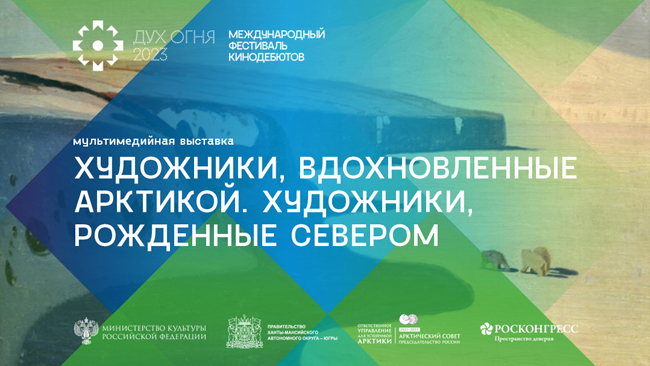
New Delhi,
March 2023.
Participants in the Spirit of Fire
Film Festival, which took place on 3–6 March in Khanty-Mansiysk,
discussed prospects for the development of ethnic cinema and the film industry
in northern Russia. The business programme events were part of Russia’s
chairmanship of the Arctic Council in 2021–2023, which are managed by the
Roscongress Foundation.
“The Spirit of Fire Festival is one
of the largest Russian film screenings. The competition programme features
films from all over the country and another 16 countries. A key part of the
festival is cinema with a definitive ethnic specificity. This year, the Spirit
of Fire had a business platform where topical issues in the film industry were
discussed, and ethnic cinema rightfully turned out to be in the business bloc’s
centre of attention,” said Anton Kobyakov, an adviser to the Russian president
and executive secretary of the Organizing Committee for Russia’s chairmanship
of the Arctic Council.
The main goal of the film festival
was to promote the cultural and historical heritage of the Indigenous peoples
of the North in the film industry. The business programme included the plenary
session ‘The Cinema of Tomorrow: Industry Partnership and Ethnocultural
Diversity’, the sessions ‘Ethnic Cinema with an Arctic Flavour. A Modern
Miracle’, ‘The Arctic: New Opportunities for Distributing Ethnic Cinema in
Russia’, and ‘Cinema Beyond the Arctic Circle: An Urban Hot Spot’, which was
dedicated to the exchange of experience in promoting ethnic cinema around the
world and in the regions of the Russian North. In addition, two events that
were attended by representative delegations from India and the United Arab
Emirates took place in a new format of film dialogues for the festival. ‘Russia–India.
Overlapping Points of Mutual Interest’ and ‘Russia–UAE.
Prospects for Co-production and the Exchange of Experience in Creating
International Projects’.
“Russia’s main priority in the
Arctic is the sustainable development of this region with constant attention
being paid to the interests and needs of the entire population living there,
including the Indigenous peoples of the North. We are happy to see the interest
of non-Arctic countries in cooperation in the Arctic. In its policy in high
latitudes, Russia proceeds from the assumption that the sustainable development
of the Arctic territories can only be ensured on the basis of dialogue and
constructive cooperation among all interested parties,” Ambassador-at-Large of
the Russian Ministry of Foreign Affairs and Chair of the Arctic Senior
Officials Nikolay Korchunov said.
The festival’s business programme
also included an educational laboratory and master classes that aim to expand
the knowledge and skills of Russian students in the film industry.
Over 700 people took part in the
events of the festival’s business block. More than 35 speakers spoke at the
sessions of the business programme. In addition, the number of visitors to the
multimedia exhibition ‘Artists Inspired by the Arctic. Artists Born in the
North’ exceeded 500 people. The exhibition was part of the audio-visual project
‘Soul of Russia. The North’, which was timed to coincide with Russia’s
chairmanship of the Arctic Council in 2021–2023 with the support of the
Roscongress Foundation.
“The business programme essentially
provided the Spirit of Fire with a new communication platform to study the best
experience of the modern film industry. This year, we placed great emphasis on
the film dialogue with India, which will expand the region’s opportunities for
film production, create a system for supporting film projects, and support the
development of young talents,” Khanty-Mansi Autonomous District – Yugra Governor
Natalya Komarova said.
The five sessions of the business
programme and two film dialogues generated more than 3.5 million views, and
almost 70,000 people read posts on the festival’s VKontakte page. Telegram
posts reached more than 500,000 people. The social network VKontakte is the
partner for broadcasting the events of the film festival.
Russia is the chair of the Arctic
Council in 2021–2023. One of Russia’s main priorities is to develop
human capital in the region, including the Indigenous peoples of the North.
Russia devotes special attention to maintaining the sustainability and
viability of the peoples of the North, promoting measures to adapt them to
climate change, improving people’s well-being, health, education, and quality
of life, and ensuring sustainable socioeconomic development throughout the
region. The Russian side has initiated projects to digitalize the cultural and
linguistic heritage of the Indigenous peoples of the North, develop renewable
energy sources, create an international Arctic research station that runs on
carbon-free energy, and ensure biosecurity in the Arctic. In addition, Russia
is preparing draft proposals on the traditional medicine of Indigenous peoples
and the development of creative industries in the Arctic, and is working on an
initiative to create Digital Museums of the Arctic.